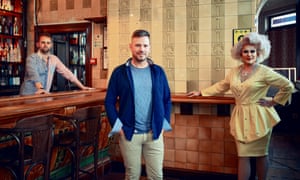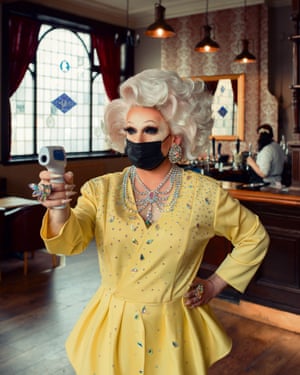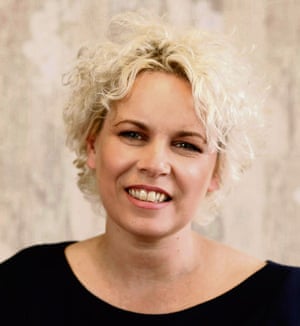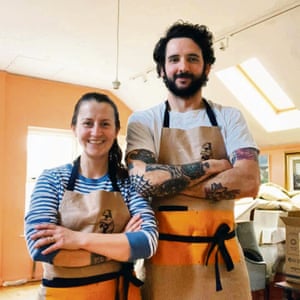
‘Mary says she’s going to cry the first time she hears a round of applause once again,’ says Robert Burnett, landlord of The Golden Cross in Cardiff, Wales’ oldest LGBT+ venue
Even before the Covid-19 pub closures were officially announced, Burnett and his team had made the difficult decision to shut up shop. “We’re best known in Cardiff as a cabaret venue for the LGBT+ scene,” he says. “Even before lockdown, people were starting to get nervous about Covid and were staying away, so I knew we’d have to close.”
But after learning that the closures were likely to be long term, Burnett decided that “the show must go on”. “We normally do cabaret four or five nights a week – our customers regularly travel to Cardiff to visit the gay bars because they don’t have those connections locally,” he says.
So, led by the pub’s resident drag queen, Baroness Mary Golds, the team decided to try streaming their cabaret show live on Facebook.

The first one received such rave reviews that they ran another the following night, this time including a link to a GoFundMe page. “We still had costs even though the pub was standing empty,” says Burnett. “I was expecting we’d raise £1,000 over four or five weeks but we reached £1,000 on that first night, thanks to the way our customers supported us.”
Buoyed by the overwhelming response, the team continued to broadcast drag shows four times a week, raising close to £16,000, much of which went to local charities and causes.
“We’ve raised almost £7,000 for charities like Homeless Hope, which looks after the feet of the homeless. We’ve also sent ‘love bundles’ to performers, because performing arts – and the performers themselves – have been hit hard by Covid.
“Mary was very much a hero, performing four nights a week – and bear in mind these people weren’t getting paid. We really were in this together.”
When it came to reopening the pub in April, customers were greeted by major changes, coordinated by bar manager Evan Perkins. “We revamped the bar area, created a bigger outside space and have sanitisers at every entry and exit point, and around the building,” says Burnett. Performers lead customers to the tables outside, while explaining the regulations.
For now, the cabaret performances continue to be streamed from an upstairs room while they make arrangements for when live entertainment can resume. “Mary says she’s going to cry the first time she hears a live round of applause – at the moment we have fake applause at the end of each song or joke,” says Burnett.
He says the response from regulars has been incredible. “I was due to leave at the end of the year – I’d said after five years I’d move on – but the community has supported us through the worst year in history for hospitality, so how can I leave now?
“Yesterday, I walked into the beer garden and it was blowing a gale but was full of people sat there in raincoats, getting soaked. They just raised their glasses and went ‘cheers’. It says a lot about how much they value this place.”
‘People have realised how important their hair salon is to them,’ says Caroline Sanderson, who runs Ego Hair Design in Inverness
“The last year has been incredibly hard but having nearly lost my business during the recession, I knew I could get through difficult times again. I’ve run the salon since 2002 and there’s 10 of us here. The salon means different things to people – for some, it’s just a haircut but for others it’s a community. Some customers come several times a week because they aren’t physically able to do their hair at home, so they really rely on us.

“I think this past year has made people realise how important their local salon is – the relationships they’ve built and how that impacts on how they feel.
“Being told we were closing was devastating but I took the mindset of ‘this isn’t going to beat me’. I furloughed everybody except my managing director and as I was already a business coach helping other salons, I used the time to write a book sharing advice for salon owners, as well as putting on free business events.
“The two of us communicated as much as we could with our team and clients, running Facebook quizzes and sharing pictures on social media of us growing out our roots for example, reminding clients we were still very much with them.
“Before reopening, the team went through infection control training and we put in a sanitising station and implemented things like PPE. We also added a doorbell so people can’t just walk in, and put signs on the floor saying where to stand and walk.
“It’s been tough, but everybody has adapted brilliantly. Hairdressers are so passionate about what they do, we’ve really missed the creativity of it all.”
‘It’s been tough, but we still have hope,’ says David Allen, head of sales and marketing at the Everyman Theatre in Cheltenham
“One of our most important goals for these first few months, and shows, is making the audience feel as comfortable as we can.

“We’ve bought thermal imaging cameras to take everyone’s temperature as they enter the theatre, which can read 30 people per second. If someone’s temperature is too high, we’ll wait a few minutes and check them with a handheld thermometer.
“Unfortunately, if they still have a high temperature, we’ll have to refund them their ticket as we have to maintain safety for everybody involved.
“Our cafe has been open since we were allowed to reopen for takeaway, and we will start offering socially distanced indoor dining in our cafe on the week of 17 May. The first two shows are on the 18th and 19th, and the audience and staff will still have to wear face coverings.
“This will be our 135th anniversary season. It’s been tough, but we still have hope.
“We did a lot of the preparation for the socially distanced performances when we were able to open last September, removing four rows of seats from the back so we could spread out the remaining rows and put more space between them. Within the rows there are seats that we don’t sell, so we’ll end up at not quite 50% of capacity.
“There are a lot of rules backstage, too. Things like the green room have changed –
we had one for everyone, but now it’s for visiting companies and we have facilities elsewhere for our staff.”
‘We’re so lucky as our customers are so loyal,’ says Ciara Ohartghaile, who runs Ursa Minor Bakehouse in Ballycastle, Northern Ireland
“We’ve actually made quite a few changes since lockdown. Something I realised I was missing was the interaction with people. Before Covid, we were predominantly a sourdough bakery with a seating area, where we served lunches very much based on local produce.

“When the cafe had to close we decided to reduce the amount of seating, move bread sales in there and expand our range of products. By moving things round we made a larger space for people, and we built a pantry area with lots of ingredients for things that people could recreate at home. We also invested in a large retail fridge to stock Irish cheeses.
“It has a very honest and open feel, and we’re able to have that connection with our customers that I’d been missing. That said, we have sanitiser at the door and counter, and ask people to pay by card when possible.
“Our delivery van is used by more than one member of staff, so it has been kitted out with sanitiser and gloves. We also try to minimise the number of staff who are working at close quarters on shift.
“When we could only serve takeaway, we realised that people had the habit of getting a loaf and some sweet things and heading off for a picnic. Because of there being more takeaway we had to invest in packaging, we went for the compostable type. I’m surrounded by boxes of boxes!
“In terms of opening more fully, we’re waiting for confirmation on whether we’ll have to do table service once people can eat inside, and when we know we’ll arrange the seating accordingly. “It’s strange because everybody is going to open at the same time, but we’re so lucky as our customers are so loyal.”
How can you help?
We can all play our part in keeping each other safe. Take these steps to help ensure your favourite business can stay open:
-
Follow the one-way system and stick to any store entry limits
-
Maintain 2-metre distancing and wear a face covering when moving around
-
Wash or sanitise your hands regularly
-
At pubs and restaurants, have your phone ready to check-in using the contact tracing app (or take a pen to give details if you don’t have the app)
-
Be prepared to pay via contactless
This advertiser content was paid for by the UK government. All together (Enjoy your high street safely) is a government-backed initiative tasked with informing the UK about the Covid-19 pandemic. For more information, visit gov.uk/coronavirus
from Lifestyle | The Guardian https://ift.tt/2QuEI1K
via IFTTT

comment 0 Comment
more_vert